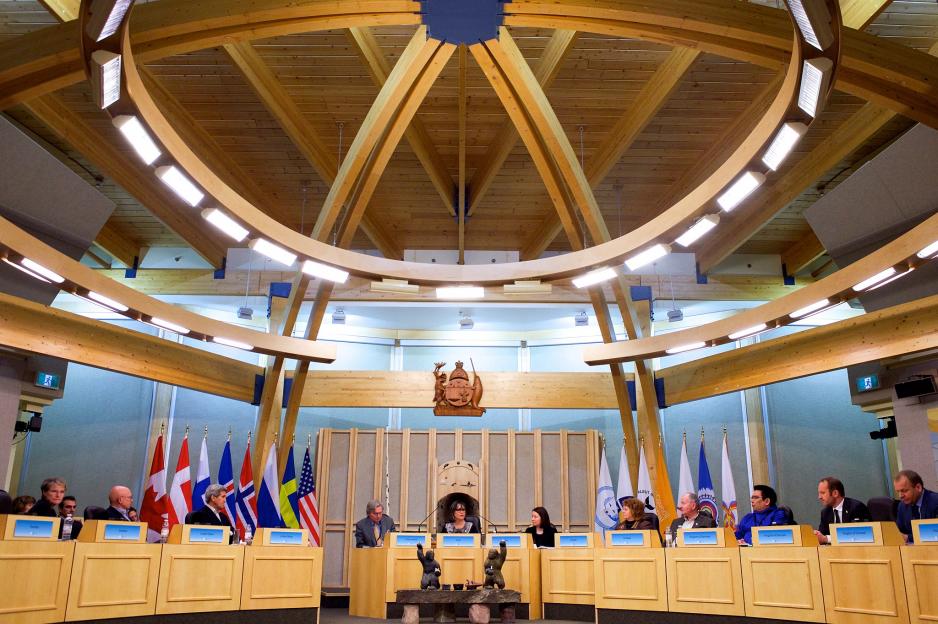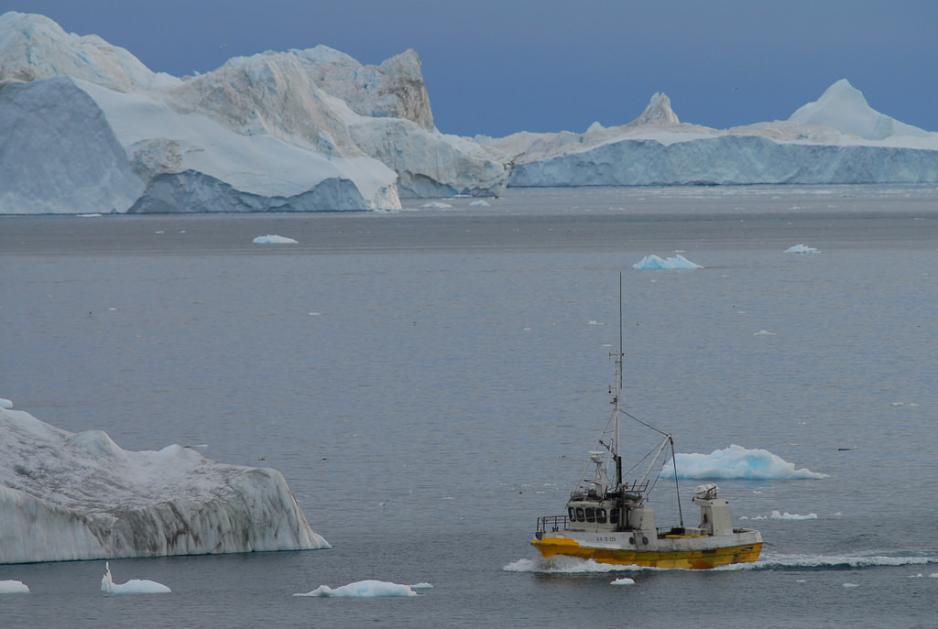USA’s Climate Skepticism Causes Concern Prior to Arctic Council Ministerial Meeting

The USA’s Secretary of State Mike Pompeo is among the eight Arctic foreign ministers expected in Rovaniemi, Finland on Tuesday 7 May. (Photo: Ron Przysucha/US State Department)
The Trump administration’s reluctance to acknowledging climate changes as a real problem is at present frustrating a series of climate efforts in the Arctic – efforts that most of the other Arctic states, including the Nordic countries, want to prioritize.
Foreign ministers from all eight Arctic states, including the USA’s Mike Pompeo, Russia’s Sergey Lavrov and Norwegian Ine Eriksen Søreide are expected in Rovaniemi, the main city in the Finnish Arctic, on Tuesday 7 May.
The Arctic Council Ministerial Meeting is a bi-annual event that is by far the most decisive political forum in the Arctic, and the fact that all eight ministers are attending carries significant symbolic value. However, pre-meeting negotiations about concrete climate efforts in the Arctic have been severely hampered by the Americans’ climate skepticism.
Pre-Meeting Pessimism
There is a risk that the foreign ministers will be influenced by the Americans and allow joint climate and environmental efforts in the Arctic to come to a stillstand or even be reduced, rather than strengthening the efforts against climate changes and increasing climate support for Arctic societies, fauna and the environment.
That is the report from a surprisingly pessimistic professor Timo Koivura over the phone from Rovaniemi. Koivurova is Director of the Arctic Centre research institute at University of Lapland, Rovaniemi and he is one of the best experts on the Arctic Council. To him, the major question prior to Tuesday’s summit is no longer whether the climate efforts can be expanded and strengthened, but rather whether the Arctic Council will be able at all to maintain the current level of efforts.
- That is the prime concern for both me as well as everybody else who is following the Arctic Council negotiations right now. The question is whether or not the US can live with the current level of climate efforts in the Arctic Council, he says.

The Arctic Council foreign ministers are meeting in Rovaniemi, Finland next week and American climate skepticism causes worries about a joint declaration. (Photo: US Department of State)
Timo Koivurova has conducted research on international cooperation in the Arctic for years. He participates in both scientific as well as practical work conducted under the auspices of the Arctic Council, and this time he also underlines the many joint results that have come out of cooperation in the Arctic. However, he is primarily concerned about the depth of the American climate skepticism. At the previous Arctic Council Ministerial Meeting, which took place in Fairbanks, Alaska in 2017, then-US Secretary of State Rex Tillerson would only be persuaded in the eleventh hour to support a series of climate initiatives. Koivurova has serious doubts about whether a similar change of direction will take place this time.
Also read: Working in the 11th hour to agree on joint declaration
Secret negotiations
The diplomatic negotiations prior to the Rovaniemi meeting are confidential. Together with representatives of indigenous peoples in the Arctic, the ministers are to agree on a joint declaration that is to stake out the course of direction for cooperation in the Arctic Council for the next two years. They are also expected to agree on the first long-term strategy for the work of the Arctic Council. However, both Canadian and Nordic experts closely following the process have recently aired major frustrations over the American negotiators.
Finnish negotiation leader Aleksi Härkönen said to ArcticToday.com last March that the negotiations are hampered by “differing opinions about the seriousness with which climate changes should be met”, whereas Radio Canada reported on how Canadian diplomats have found it “hard to find formulations, in particular regarding climate, that the USA can support”. Other sources confirm these difficulties. Whether the Council will succeed in agreeing on the long-awaited strategy will remain unclear until the very end.

Fishing boat in Disco Bay on Greenland. (Photo: Peter Prokosch/GRID Arendal)
- In an attempt to secure joint progress, without mentioning climate changes directly and through that provoking the American negotiators, the fans of a more activist line have tried for some time to secure focus on the UN Sustainable Development Goals. However, even on this point the American reluctance appears strong. – I have noticed that in my own work, Koivurova says.
- Initially, they found it most problematic when I focused on select parts of the SDG’s, however, in the end they requested that I make no mention of the SDG’s at all, he says over the phone from Rovaniemi.
The climate is erased
The American efforts to avoid climate changes in the Arctic reached a preliminary peak last April, when the American coast guard published its 46-page strategy for future operations in the Arctic.
The strategy succeeded in completely avoiding the formulation ‘climate change’, whereas the climate damages in the Arctic – including the countless landslides, eroded coast communities, acidification of oceans, fauna under pressure, increasing amount of storms, broken infrastructure, vanishing ice and thawing permafrost – are rather described using euphemism such as ‘environmental transformation’.
The Trump administration is simultaneously working hard to secure access to oil exploration in one of the most famous natural parks, the Arctic National Wildlife Refuge (ANWR), which is situated on the northeastern coast of Alaska, bordering on the Arctic Ocean, for the international oil industry.
Worse than Russian armament
In the media as well as in the political debate about the Arctic, the Russian armament in the region often creates headlines. Russia has reopened a series of bases along its northern coastline and on islands in the Arctic Ocean, a development also monitored closely by the Danish military intelligence services in its risk assessments.
Read more: China acquires 20 percent stake in Novatek’s latest Arctic LNG project
For the first time since WW2, American troops are permanently stationed in Norway, the USA and Europe are holding unswervingly to grave sanctions against Russia following the 2014Crimea crisis, and disarmament agreements have been cancelled. However, the permanent observers of Arctic cooperation nevertheless still hold the belief that Russia and the other Arctic states sincerely wish to continue practical cooperation in the Arctic, unaffected by security politics.
Also read: US Coast Guard awards contract for new polar class icebreaker
China more divisive than security politics
In January 2018, more than 60 political scientists, lawyers and other members of an Arctic security policy network nominated the Arctic Council for the Nobel Peace Prize, in particular because the Council in their opinion has maintained the ability to continue its work for Arctic communities, biodiversity, climate research and the environment despite security policy tensions.
Read more: Does the Arctic Council have enough power to keep the Arctic a peaceful region?
Timo Koivurova argues that the American reluctance to acknowledge climate changes in the Arctic today appear to be more disruptive to Arctic Council cooperation than do the security policy factors.
- The Arctic has always been significant for Russia’s overall military strategy, however, I do not perceive that to have caused disturbances to the work of the Arctic Council, he says.

Rosatomflot icebreaker escorting a convoy of vessels through the icy waters of the Northern Sea Route. Source: (Courtesy of Rosatomflot)
- The relationship between Russia and the western countries has not been a core problem to the Arctic Council, but that has been the case for the contagious effect of the Trump administration, and it is growing. I believe it is fair to say that it has also disturbed the ongoing work of the Arctic Council, he says.
In 2016, the eight governments represented in the Arctic Council (Russia, the USA, Canada and the five Nordic countries) agreed on a reinforced effort against a.o. soot emissions, which constitutes a serious and often overlooked climate problem in the Arctic. Soot particles from industry, coal power plants and households in the USA, Europe and Asia travels with the wind to the High North, where it colors snow and ice black which, in turn, attracts more solar heat and increases the melting speed and damages the climate.
Several of the Arctic governments want to strengthen this effort, though that may prove difficult.
Increasing worries
- Now that the Ministerial Meeting is rapidly approaching, worries are growing because discussions about the climate are so difficult. The message is that the Trump administration could not care less about multilateral for a, says Koivurova. Through the Arctic Council, the Arctic governments have – in addition to the efforts against soot and methane – also initiated a series of practical projects that are to help Arctic communities adapt to climate changes. However, the American diplomats are currently hitting the brakes.
Timo Koivurova mentions the example of how the plans about a new joint Arctic commission focusing in particular on environmentally protected zones in Arctic waters now may have to be cancelled or indefinitely postponed. The prospects for the Arctic governments’ playing a more active and unifying role on behalf of the Arctic in the international climate negotiations, and e.g. securing a stronger global effort against soot emissions, appear to be dwindling.
Will Pompeo tighten the grip further?
Like Koivurova stresses, cooperation in the Arctic Council and its various bodies gives a series of solid results. In 2018, a historic ban on fisheries in the Arctic Ocean was introduced, a ban currently in force for a period of 16 years or until scientists get an overview over how fish stocks move in keeping with global warming. Binding agreements on preventing oil spill disasters, search and rescue at sea as well as research are slowly being implemented into practice. Scientists in the Council’s scientific working groups produce heaps of data included in the development of Arctic communities, international climate negotiations and in work for global biodiversity. It is also slowly seeping into China, Japan, South Korea and other countries that have been admitted as observers at the Arctic Council. The Finns, who have held the chairmanship of the Arctic Council for the past two years, are proud that the World Meteorological Organization now contributes to more precise climate models and better ice and weather forecasts for the Arctic.
The fact that all eight Arctic foreign ministers are present in Rovaniemi on Tuesday will rightfully be interpreted as a testimony to the strength of Arctic cooperation. However, the attendance of in particular Michael Pompeo may, according to Timo Koivurova, also prove to complicate matters. Being one of president Trump’s closest allies, Pompeo may not be inclined to accept co-responsibility for even mildly worded declarations if these were to commit the USA to new or even just existing agreements about climate efforts.
Martin Breum is a Danish journalist and author of several books about the Arctic and the Danish Unity of the Realm.
This article was originally written in Danish and has been translated by HNN’s Elisabeth Bergquist.

